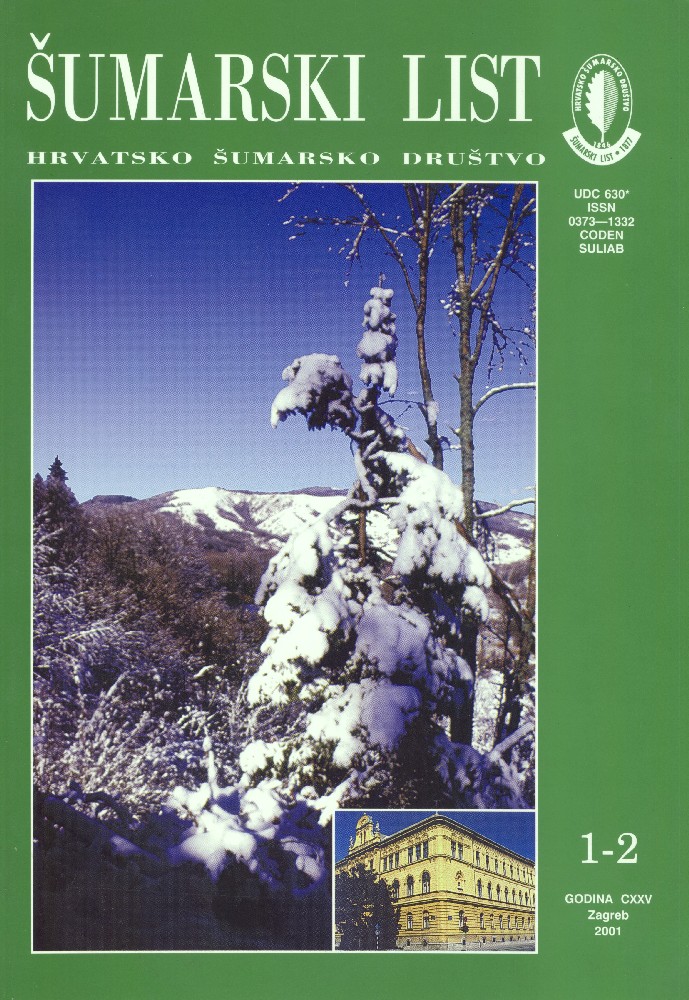| |
| IZVORNI ZNANSTVENI ČLANCI |
| |
|
|
| Lukić, N. | UDK 630* 561 +182.2 (Fagus sylvatica L.) |
| Dendroclimatology Analysis of Common Beech (Fagus sylvatica L.) on Papuk
pdf
HR
EN
|
3 |
| Božić, M., Čavlović, J. | UDK 630* 622 + 624 + 522 (001) |
| The Relationship Between Dominant Height. Dimension of Crop Maturity and Normal Growing Stock in Selection Stands
pdf
HR
EN
|
9 |
| Franjić, J., Škvorc, Ž., Čarni, A. | UDK 630* 188(001) |
| Numerical Analysis of Phytosociological Releves in Beech-Fir Forests (Abieti-Fagetum s. l.) in Croatia
pdf
HR
EN
|
19 |
| Šajković, A. | UDK 630* 120 +UDK 301.153 (001) |
| The Influence of the Quality of Life on Ecological Alttitude
pdf
HR
EN
|
27 |
| |
| PREGLEDNI ČLANCI |
| |
|
|
| Sabadi, R. | UDK 630* 904 |
| Portugal, a Brief Note on its Forestry and Forest Industries
pdf
HR
EN
|
35 |
| Antonić, O. | UDK 630* 181 + 181.3 |
| Is the Pedunculate Oak species of Climatogenic Distribution in Croatia?
pdf
HR
EN
|
45 |
Summary: Ecological conditions of spatial distribution of the pedunculate oak (Quercus robur L.) in Croatia are discussed in this paper. Pedunculate oak in Croatia is the main tree species in two forest communities: Genisto elatae - Quercetum roboris Ht. 1938 and Carpino betuli - Quercetum roboris (Anić 1959) emend. Rauš 1969. In the first community which resides on flood-plains, the presence of pedunculate oak, as well as the majority of other species, is conditioned by additional moistening by groundwater and flood, i.e. its distribution is not climatogenic. The second community is floristically similar to the climatogenic community of the sessile oak and common hornbeam (Epimedio-Carpinetum betuli (Ht. 1938) Borhidi 1963). Although the other species of Carpino betuli - Quercetum roboris community are not influenced by groundwater due to the shallower rooting, the presence of pedunculate oak, as a species which can develop deep rooting system, is often (but not allways) conditioned by additional moistening by groundwater in this community too. This is especially evident on lighter soils with unfavourable hydropedological characteristic (low capillary rise and available soil water capacity). Besides, areas under Carpino betuli - Quercetum roboris community and Epimedio - Carpinetum betuli community have similar macroclimate, but they differ geomorphologically - the first community avoides sloped terrain which indirectly implies moister habitats. It can be generally concluded that pedunculate oak in Croatia is distributed out of additionally moistened areas (by groundwater and/or floods) only when hydropedological and/or geomorphological conditions are favorable.Knowing environmental factors which control presence and growth of the pedunculated oak on the specific site is important for the forest management and also for designing of the hydro-technical measures based on principles of sustainable development. Consequently, the future research has to be undertaken to enable detailed understanding of interactions beween environmental factors (e.g. hydrological and hydropedological characteristics, evaporation, transpiration, precipitation) which together result in the presence of pedunculate oak on the specific site, including the problem of intraspecies (ecological races of pedunculate oak) and interspecies (toward the sessile oak) genetic variability.
Keywords: pedunculate oak, vegetation climax, macroclimate, groundwater, rooting, hydropedological characteristics, terrain slope, sessile oak.
|
| |
| STRUČNI ČLANCI |
| |
|
|
| Dimitrov, T. | UDK 630* 432 |
| The Conclusion of the Croatian Government and the Proposal of Preventive Forest Fire Protection Programme in the Republic of Croatia
pdf
HR
EN
|
57 |
| Tonković, D. | UDK 630* 375 |
| Forest Railways in Croatia
pdf
HR
EN
|
63 |



